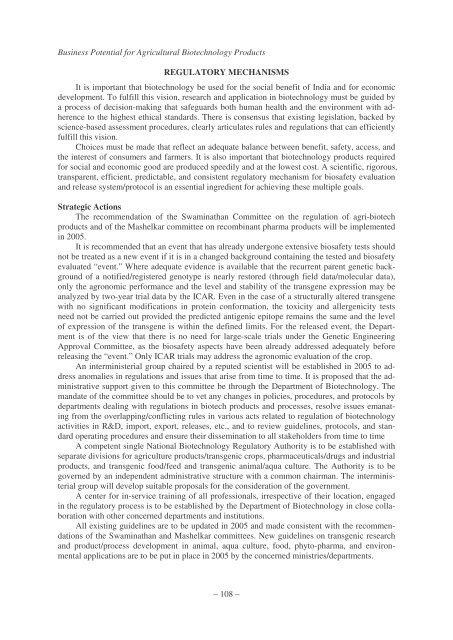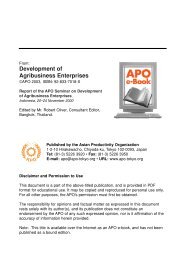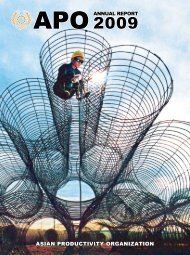Business Potential for Agricultural Biotechnology - Asian Productivity ...
Business Potential for Agricultural Biotechnology - Asian Productivity ...
Business Potential for Agricultural Biotechnology - Asian Productivity ...
Create successful ePaper yourself
Turn your PDF publications into a flip-book with our unique Google optimized e-Paper software.
<strong>Business</strong> <strong>Potential</strong> <strong>for</strong> <strong>Agricultural</strong> <strong>Biotechnology</strong> Products<br />
REGULATORY MECHANISMS<br />
It is important that biotechnology be used <strong>for</strong> the social benefit of India and <strong>for</strong> economic<br />
development. To fulfill this vision, research and application in biotechnology must be guided by<br />
a process of decision-making that safeguards both human health and the environment with adherence<br />
to the highest ethical standards. There is consensus that existing legislation, backed by<br />
science-based assessment procedures, clearly articulates rules and regulations that can efficiently<br />
fulfill this vision.<br />
Choices must be made that reflect an adequate balance between benefit, safety, access, and<br />
the interest of consumers and farmers. It is also important that biotechnology products required<br />
<strong>for</strong> social and economic good are produced speedily and at the lowest cost. A scientific, rigorous,<br />
transparent, efficient, predictable, and consistent regulatory mechanism <strong>for</strong> biosafety evaluation<br />
and release system/protocol is an essential ingredient <strong>for</strong> achieving these multiple goals.<br />
Strategic Actions<br />
The recommendation of the Swaminathan Committee on the regulation of agri-biotech<br />
products and of the Mashelkar committee on recombinant pharma products will be implemented<br />
in 2005.<br />
It is recommended that an event that has already undergone extensive biosafety tests should<br />
not be treated as a new event if it is in a changed background containing the tested and biosafety<br />
evaluated “event.” Where adequate evidence is available that the recurrent parent genetic background<br />
of a notified/registered genotype is nearly restored (through field data/molecular data),<br />
only the agronomic per<strong>for</strong>mance and the level and stability of the transgene expression may be<br />
analyzed by two-year trial data by the ICAR. Even in the case of a structurally altered transgene<br />
with no significant modifications in protein con<strong>for</strong>mation, the toxicity and allergenicity tests<br />
need not be carried out provided the predicted antigenic epitope remains the same and the level<br />
of expression of the transgene is within the defined limits. For the released event, the Department<br />
is of the view that there is no need <strong>for</strong> large-scale trials under the Genetic Engineering<br />
Approval Committee, as the biosafety aspects have been already addressed adequately be<strong>for</strong>e<br />
releasing the “event.” Only ICAR trials may address the agronomic evaluation of the crop.<br />
An interministerial group chaired by a reputed scientist will be established in 2005 to address<br />
anomalies in regulations and issues that arise from time to time. It is proposed that the administrative<br />
support given to this committee be through the Department of <strong>Biotechnology</strong>. The<br />
mandate of the committee should be to vet any changes in policies, procedures, and protocols by<br />
departments dealing with regulations in biotech products and processes, resolve issues emanating<br />
from the overlapping/conflicting rules in various acts related to regulation of biotechnology<br />
activities in R&D, import, export, releases, etc., and to review guidelines, protocols, and standard<br />
operating procedures and ensure their dissemination to all stakeholders from time to time<br />
A competent single National <strong>Biotechnology</strong> Regulatory Authority is to be established with<br />
separate divisions <strong>for</strong> agriculture products/transgenic crops, pharmaceuticals/drugs and industrial<br />
products, and transgenic food/feed and transgenic animal/aqua culture. The Authority is to be<br />
governed by an independent administrative structure with a common chairman. The interministerial<br />
group will develop suitable proposals <strong>for</strong> the consideration of the government.<br />
A center <strong>for</strong> in-service training of all professionals, irrespective of their location, engaged<br />
in the regulatory process is to be established by the Department of <strong>Biotechnology</strong> in close collaboration<br />
with other concerned departments and institutions.<br />
All existing guidelines are to be updated in 2005 and made consistent with the recommendations<br />
of the Swaminathan and Mashelkar committees. New guidelines on transgenic research<br />
and product/process development in animal, aqua culture, food, phyto-pharma, and environmental<br />
applications are to be put in place in 2005 by the concerned ministries/departments.<br />
– 108 –
















